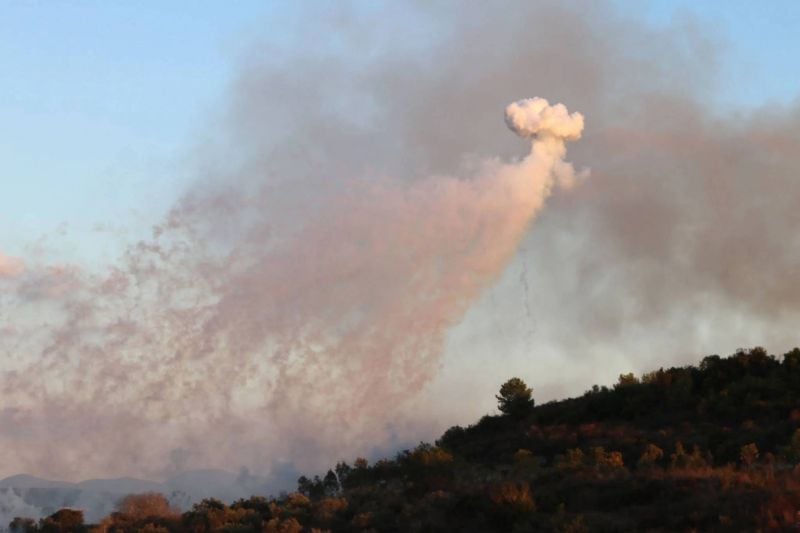
Shells fired by the Israeli army explode near the village of Dhayra, in southern Lebanon, Oct. 16, 2023. (Credit: AFP)
Follow our live coverage here.
Since the outbreak of war between Hamas and Israel on Oct. 7, and the heightening of tensions on its southern border, Lebanon has had to face up to the risk of being dragged into the conflict. But in the business realm, uncertainty is the order of the day, and insurance companies have taken the lead, even affecting other sectors such as air transport.
In a televised speech on Friday, the CEO of Middle East Airlines (MEA), Mohammad al-Hout, promised to cut flights in half, adding that insurance companies would now only cover 20 percent of the estimated value of aircraft in the event of war-related accidents.
Against this backdrop, Assaad Mirza, President of the Association of Insurance Companies of Lebanon (ACAL), talked to L’Orient-Le Jour about why Lebanese insurance companies are taking such a heavy-handed approach in these troubled times.
How have insurance companies positioned themselves since Oct. 7?
The country’s delicate situation is already having an impact on the insurance sector. The major change is that war risks are no longer covered and are no longer included in the lines of the new insurance policies. In other words, damage suffered by a Lebanese citizen in connection with a possible war in Lebanon will no longer be covered under new policies. It is important to remember, however, that customers who have taken out a previous policy that includes war risks will continue to be covered.
For insurance companies, Lebanon is no longer a country at risk, it is already at war.
In reality, the judgments of Lebanese insurers depend on those of European reinsurers — German, French or English — who dictate the course of action at the local level. Orders come from reinsurers who are well-informed about the regional situation and make their decisions accordingly.
Which sectors are most affected by this change?
The sector most vulnerable to war risks is freight transport. Insurers have notified importers that they are deleting war risks from new insurance policies. In practice, however, each new ship means a new insurance contract to be signed. The changes of the last few days have therefore had a rapid impact on the goods transport sector, disrupting the logistics chains of Lebanese traders and industrialists. Many are wondering how they can consider importing new goods without full insurance contracts. They are afraid and know that they will be operating in a difficult environment over the next few months.
On the other hand, the renewal of life insurance policies is also affected by the removal of clauses covering war risks. Here, however, the risk is less than in the case of business, and depends above all on the situation of the insured. In this respect, life insurance policies for journalists who travel to the front line are outlawed. For Lebanese citizens, the calculation is based on a geographical gradient, depending on where the person lives and works. For foreign reinsurers, however, there is no differential: the whole of Lebanon is treated equally. As a result, life insurance premiums are skyrocketing.
What impact will this have on the lives of the Lebanese?
As long as the risk of imminent war is present, nothing will change for insurance companies. However, the situation does not seem to be stabilizing at the moment. The temporality of this change is long-term. No one knows how to anticipate events and in what direction the country is heading. As far as the outlook is concerned, according to the information I have, Lebanese traders and industrialists should have enough foodstuffs to keep the market calm for the next three to four months.
If the status quo on insurance persists, the consequences of a drastic reduction in imports are likely to be felt, firstly because of a fall in the supply of essential foodstuffs, and secondly because of a rise in prices due to higher transport costs.
This interview was originally published in French in L'Orient-Le Jour.